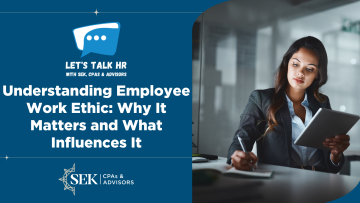Recent News & Blog / Understanding employee work ethic: Why it matters and what influences it

October 2, 2025
Work ethic is often seen as a personal trait, something an employee either has or doesn’t. But in reality, work ethic is shaped by a combination of personal values and workplace conditions. As an employer, understanding these dynamics can help you foster a culture where employees are motivated, engaged, and productive.
What Is Work Ethic?
Work ethic refers to an individual’s attitude toward work, including qualities like reliability, responsibility, initiative, and commitment to quality. Employees with a strong work ethic typically:
- Show up on time and consistently
- Take ownership of their tasks
- Demonstrate integrity and accountability
- Strive for excellence in their work
But when work ethics seem lacking, it is important to look deeper because the root cause isn’t always laziness or disinterest.
Why Employees May Struggle with Work Ethic
- Employer-Related Factors: Sometimes, the workplace itself contributes to diminished motivation and engagement. Common causes include:
- Lack of clear expectations
- Unrealistic workloads or burnout
- Poor leadership or management
- Toxic work environment
- Limited growth opportunities
- Employee’s Personal Situation: Employees are human, and life outside of work can significantly influence their behavior on the job. Factors include:
- Personal stressors
- Lack of alignment with role
- Generational or cultural differences
- Mental health challenges
What Employers Can Do
Improving work ethics start with creating an environment where employees feel valued and supported. Consider:
- Setting clear expectations and providing regular feedback
- Recognizing and rewarding good performance
- Offering professional development opportunities
- Promoting work-life balance and mental health resources (for example, an EAP)
- Building a culture of trust and respect
Building and maintaining a strong work ethic is a shared responsibility. Employers should set clear expectations, provide consistent feedback, and create an environment where employees feel valued and supported. At the same time, employees must take ownership of their roles, demonstrate reliability, and look for ways to contribute to the team. When both sides commit to accountability and open communication, it creates a positive productive workplace.
 If you have questions about this article, contact Laura Stover, SHRM-SCP, SPHR, Director of HR Advisory Services, by emailing lstover@sek.com or completing the contact form below.
If you have questions about this article, contact Laura Stover, SHRM-SCP, SPHR, Director of HR Advisory Services, by emailing lstover@sek.com or completing the contact form below.
SEK provides outsourced HR services tailored to your business needs, including the creation of employee handbooks, job descriptions, HR policies & procedures, and more. We assist with navigating employment regulations and building a well-structured, compliant work environment. Whether you're looking to supplement your current HR department or fully outsource the function, we provide personalized solutions to help you manage your workforce efficiently. Let us handle the complexities of HR, so you can focus on growing your business.